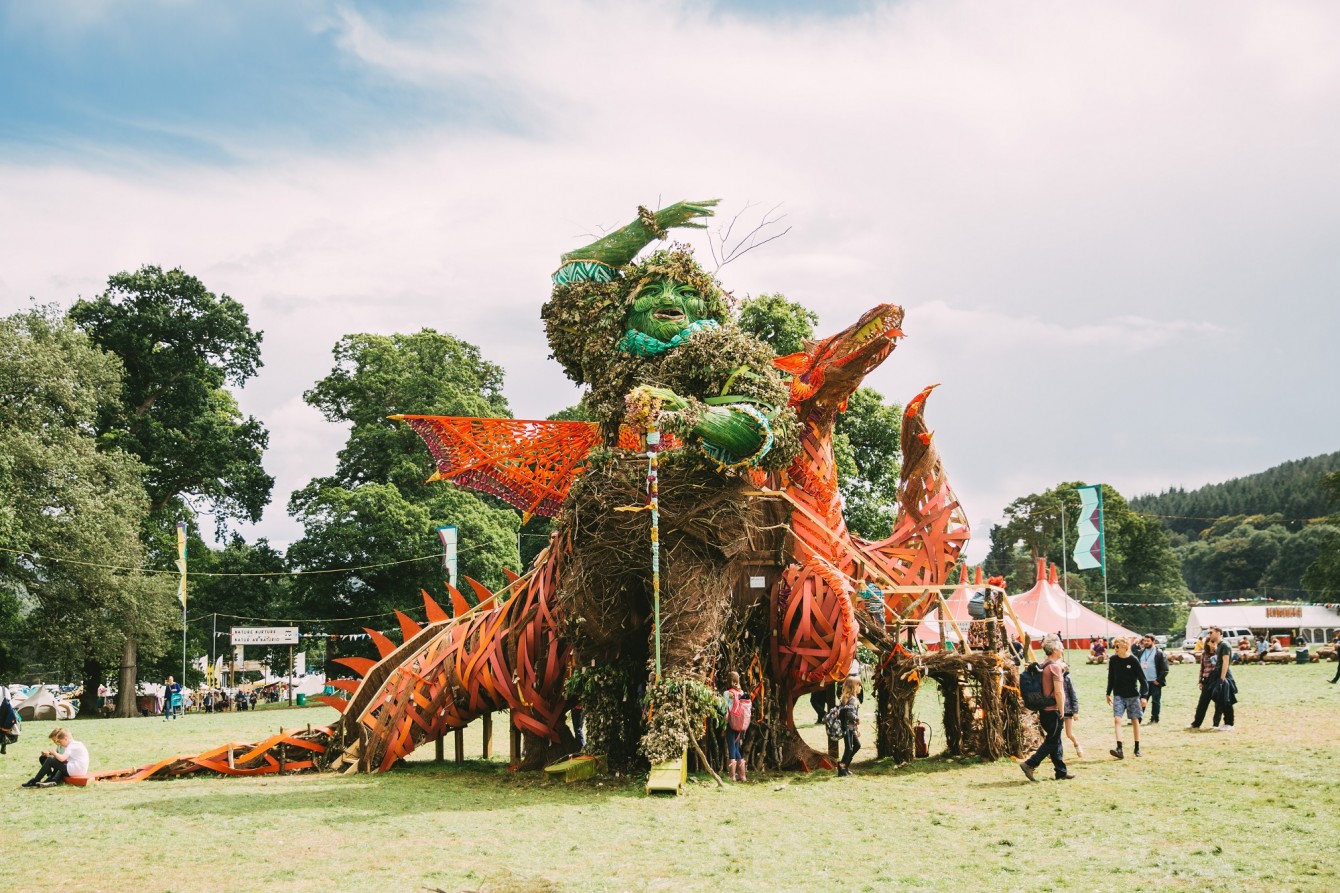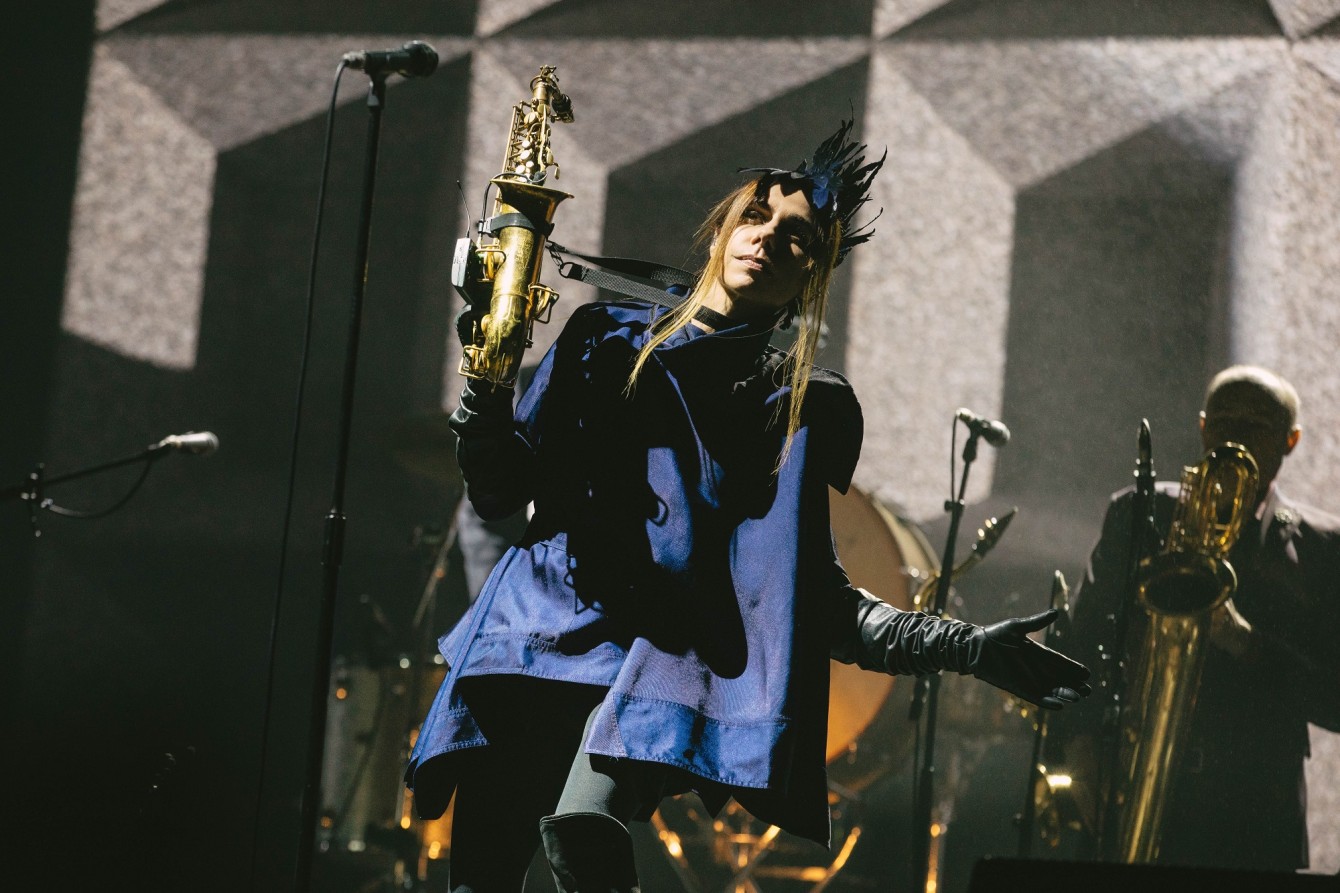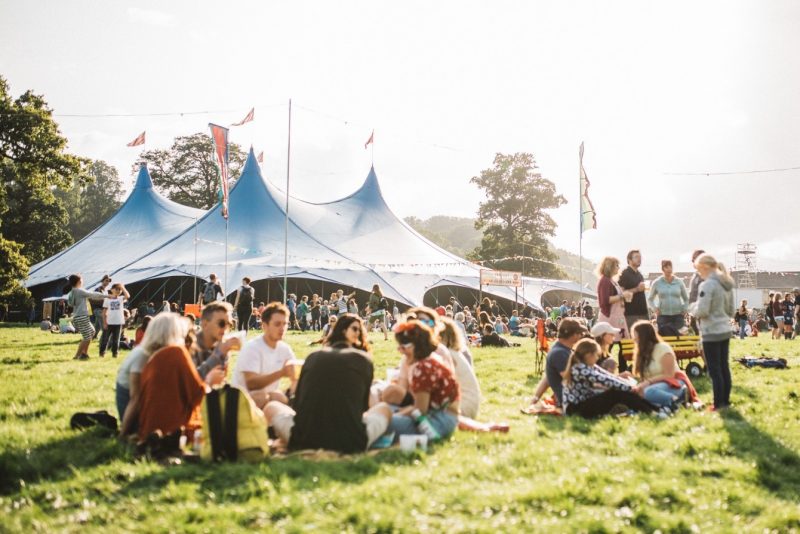My expectations did not champion in modesty, to be honest. But as soon as I sat foot onto the ground of Green Man 2017, my mind immediately was at ease and I knew that expectations are to be forgotten around here. The beautiful landscape of Brecon Beacons national park with its impressive mountain view, the relaxed crew and attendees, every single detail unfolding with every further step into the magic otherworld the festival’s creators devised restored my faith in a music festival of a place to get lost in. Sometimes a step out of the comfort zone gets you to those places.
The first striking thing: The love for details. Not only in the figure of the iconic Green Man (or Woman?) but in every corner of the main festival areas. Eclipses, druids, hot tubs…don’t know where to start or end.

This year’s Green Man (or Woman, or mother of dragons?) before being burned to the ground – photo by Olivia Williams
The second striking thing: No commercials. No stage hosted by energy drink X, no stupid waving hands, no useless flyer landing directly in the litter. No visible main contractors (in fact, there was enough craft beer and cider to explore for years to come). Except for some science organisations hosting stalls, there is no visible sign of ‘Buy Me!’ at this festival. To shed a little more light on this very pleasant and interesting ethos, as well as to get some more background on the festival, I confronted Green Man’s director Fiona Stewart with some of my annoying ‘paint-me-the-big-picture-interview’ stuff beforehand. Here’s what she had to say.
How exactly does the special, non-corporate ethos of Green Man show itself during the festival?
FS: It shows itself by not being present. Imagine a world where nothing has been corporately manipulated to make you think, purchase or act, which celebrates the amazing, tastes great and look really interesting just because it is. It’s odd but if you really think about it there are very few places where that happens any more, and to be in a place devoid of that is a sweet and very real experience.
And how did that ethos evolve or was it part of the whole idea of Green Man from the beginning?
Bringing the ethos of Green Man into a festival may have started with me but the concept of an iconic figure that celebrates the natural world and parties in a field is something that is part of many cultures since time began.
I have just tried to remind people that this is present in their lives and maybe something they would enjoy and get something out of.
How much influence does Wales, its history of industrialization and today’s socio-economic status have on the festival’s main idea?
For such a small nation Wales historically has had a massive impact on the world through social reform, such as the Chartist Movement and the National Health Service, as well as being the birthplace of the industrial revolution. It had to adjust to the loss of industry through the inevitable outcome of technological development and that is spreading across the world. I am not an economist but it’s obvious that we will need to adjust to diminishing job opportunities. This could not have come at a worse time as the adulation of stuff over human consumes society at the moment. Thinking of different ways to interpret commerce in an ethical creative way while retaining commercial viability is an achievable challenge. Green Man is a commercial business and like all small companies runs through income achieved, but we run it in a way that enables others to get something from it too. So there are opportunities for arts development, small business support, community development and the promotion of science education and the discovery of new innovations.
Does Green Man also serve as some kind of blueprint for future economic (or post-economic) possibilities?
These aspects of Green Man are not shoved in peoples faces they are just part of the festival, and if you didn’t know exactly what they were you probably wouldn’t see it was going on which is how it should be. We would never run any project that would effect the bottom line, and we still do ok working like this. But it’s true: The festival would be more profitable if profit was the prime target. I am not going to get up myself and start pontificating about life choices and bollocks like that – in the end why not do something you love and give back at the same time. It’s a hell of a lot more enjoyable to live and work this way.
What role does economic growth play in your planning?
Creating the festival with people I care about and seeing people enjoy it is my motivation, but that would be impossible if its not economically robust. Unusually Green Man is run in house, with much of the operation undertaken by us this reduces the overall festival costs by about 30% as its not contracted out to third parties. I am not planning on making Green Man bigger and capped the size of the event 5 years ago. I am more into making it better and better rather than bigger. We are running various Green Man spin-offs such as Einstein Garden the science area which is now on tour, also Courtyard the Welsh beer festival tours as well. There is no real strategy in this its just we knew it would work, there was a demand from the audience and it would be fun to do.
Let’s speak budgets: Especially the salaries for artists tended to explode in recent years; additionally, there are festivals struggling with what could be described as the first forerunners of climate change; severe weather conditions could be the potential end for a festival years in the running (we had a few cases here in Germany), also because of higher insurance contributions. Question is: How did you manage to grow under these conditions and is Green Man fit for a potential de-growth as well?
Running a festival has always been challenging and when I first started they were anti establishment events, disliked by the Police and rural communities in the UK. Getting permission to put them on at all was incredibly difficult and managing security on site was challenging. Now the challenges have changed to more commercial issues you mentioned, the incredible competition in an overcrowded UK festival scene with over 2000 other events and the emergence of festival monopolies. Its not and has never been an easy thing to do and I am sure there will be other challenges that pop up in the future. We are lucky Green Man has achieved a level of success, but none of us take that for granted. If you don’t have a stand out festival concept that engages an audience then you don’t have a successful festival, and we work hard to create and retain that. Its a group exercise and the people I work with have a lot of freedom in the areas they work with. They care a lot about the festival and put all their dreams and ideas into it. We would always have to be the innovators, would never copy other festival concepts or content ideas that would diminish that.

PJ Harvey performing at Green Man 2017 – photo by Ponneh Ghana
With all that said, let’s speak about what a music festival is about: the music. PJ HARVEY delivering a marvelous and unparalleled closing show, KATE TEMPEST and SLEAFORD MODS unfurling their furious lines, ALDOUS HARDING and BIG THIEF mesmerizing the contemplative Walled Garden-stage, LIARS, THEE OH SEES or the notorious SHAME destroying the Far Out-stage: This festival has a wide capacity trusting on its more mainstreamish booking alone. Local acts, the Green Man Rising program and stage, talks, movies or circus art add the explorative flavour to it. You won’t and can’t get bored.
Although I have my doubts about the festival industry as a whole and the often lazy entertainment factor of music festivals in particular, Green Man did not fail to amaze. Simply because this is such a dedicated and fondly curated happening in all its details. Green Man has the potential to be everybody’s darling: Music geeks, dropouts, escapists, neo-hippies, stressed-out parents with stressed-out kids, families, party people – just take a daring step into the sometimes foggy, often moist, sometimes sunny and always welcoming world that is the Green Man Festival in Brecon Beacons.
—



